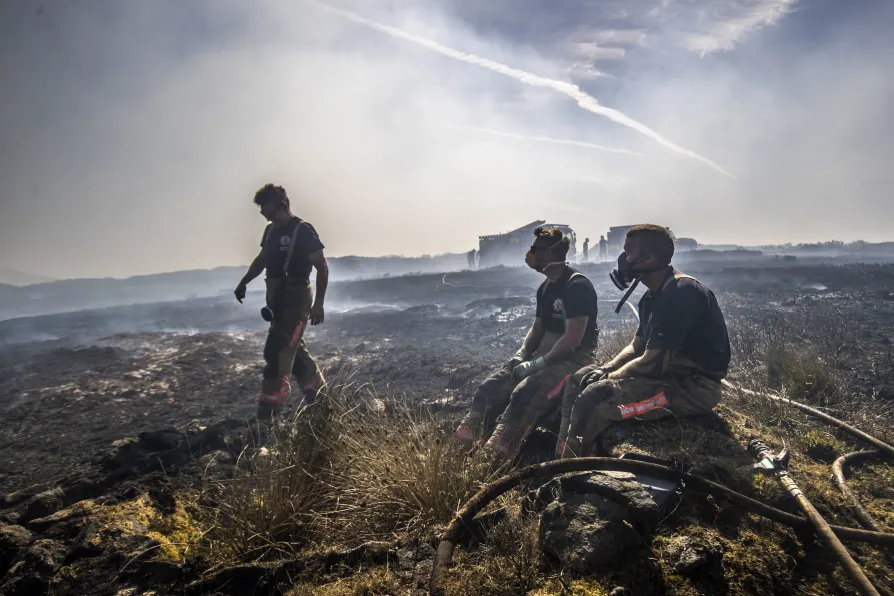This weekend, the NEU holds a special conference to debate changing its approach to organising teaching assistants, which a 2017 TUC agreement forbids. General secretary DANIEL KEBEDE outlines the choices before delegates
Since 2010, one in five firefighter jobs has disappeared alongside 30% funding cuts — all while climate breakdown brings record blazes and flooding. It’s time to fund our fire service properly, writes FBU general secretary STEVE WRIGHT

 CLIMATE CHANGE: Firefighters tackle a wildfire on Saddleworth Moor, Greater Manchester, June 2018
CLIMATE CHANGE: Firefighters tackle a wildfire on Saddleworth Moor, Greater Manchester, June 2018
TALK to any firefighter and they will be able to describe the impact of 15 years of cuts: firefighter posts axed, fire stations closed, response times slowing, communities left without fire cover.
Now, just over a year since Labour was elected, it has been revealed that fire and rescue services are facing a further round of brutal cuts. The National Fire Chiefs Council hasn’t always been the most outspoken about the effects of austerity. But now, its modelling is showing that cuts imposed by the Labour government could equate to the loss of 2,300 front-line firefighter posts in England alone.
Since 2010, we have lost one in five firefighter jobs, meaning that we have 12,000 fewer firefighters. Central government funding has been slashed by 30 per cent in cash terms (so much more in real terms), leaving fire and rescue services scrambling for scarce resources. But these fresh cuts are as deep as ever, at a time when investment is the only way to prevent critical failure.
With a record 900 wildfires raging across the country this year so far, and flooding incidents predicted to continue wreaking devastation, firefighters are our main defence against the dangers of climate breakdown.
The government is — quite literally — playing with fire. Fire-related fatalities rose by 8 per cent this year, an increase of 12 per cent over the past five years. Cuts cost lives, and it’s only a matter of time before we face another avoidable tragedy.
And public services across the board continue to operate in a state of underfunded emergency.
Reports of the death of austerity have been greatly exaggerated by those in power. Instead, we’re facing Austerity 2.0, barely repackaged and accompanied by the same old narrative of “fiscal responsibility.”
But this rhetoric doesn’t wash with those working on the front line. Day in and day out, public service workers are pushed beyond limits and into dangerous situations, propping up a crumbling system.
Promises of growth mean nothing without investment. The government knows that people can just look around to see the effect of political failure: decaying facilities, long GP queues, crumbling schools, and empty fire stations. This is the fabric of our everyday lives: services and utilities that we all rely on or could find ourselves needing at any time.
The Chancellor says she wants to “rebuild Britain’s foundations.” Yes, we urgently need to upgrade infrastructure, transport networks, hospitals, schools and more.
But where is the money to do it? Without the workers — the teachers, doctors, nurses, firefighters — these are all just empty buildings. To truly rebuild, we need serious and sustained central government funding for public services, including jobs and wages.
The money is there, and it’s time the government started collecting it. In other words, Labour could introduce a wealth tax to raise billions of pounds.
Tax Justice UK has found that a 2 per cent levy on individuals who own assets worth more than £10 million (0.04 per cent of the British population) would raise £24 billion a year.
Instead, the government continues pandering to Reform UK, feeding the far-right and paving their way to electoral gains. The rise of Nigel Farage seems to be the only growth Labour has managed to achieve.
The choice is clear: fan the flames of xenophobia, racism, and fear — or invest in public services, jobs, and improving people’s lives.
The Fire Brigades Union will be standing alongside thousands at the Make Them Pay rally on September 20, taking the demand for a wealth tax to Whitehall.
While firefighters deal with increasing extreme weather events, saving lives and homes, the oil and gas bosses creating the crisis continue to sit back and rake in profits.
There’s no excuse. It’s time for the government to protect workers, invest in services, and tackle the climate crisis — and for billionaires, the super-rich, and corporations to start paying up.

MATT WRACK issues a clarion call for a rejuvenation of public services for the sake of our communities and our young people

When it comes to extreme weather events, from wildfires to flash floods, it’s firefighters who are on the front line of defence, but services have been cut to the bone, and government is not taking seriously its responsibility for the environment, says STEVE WRIGHT












